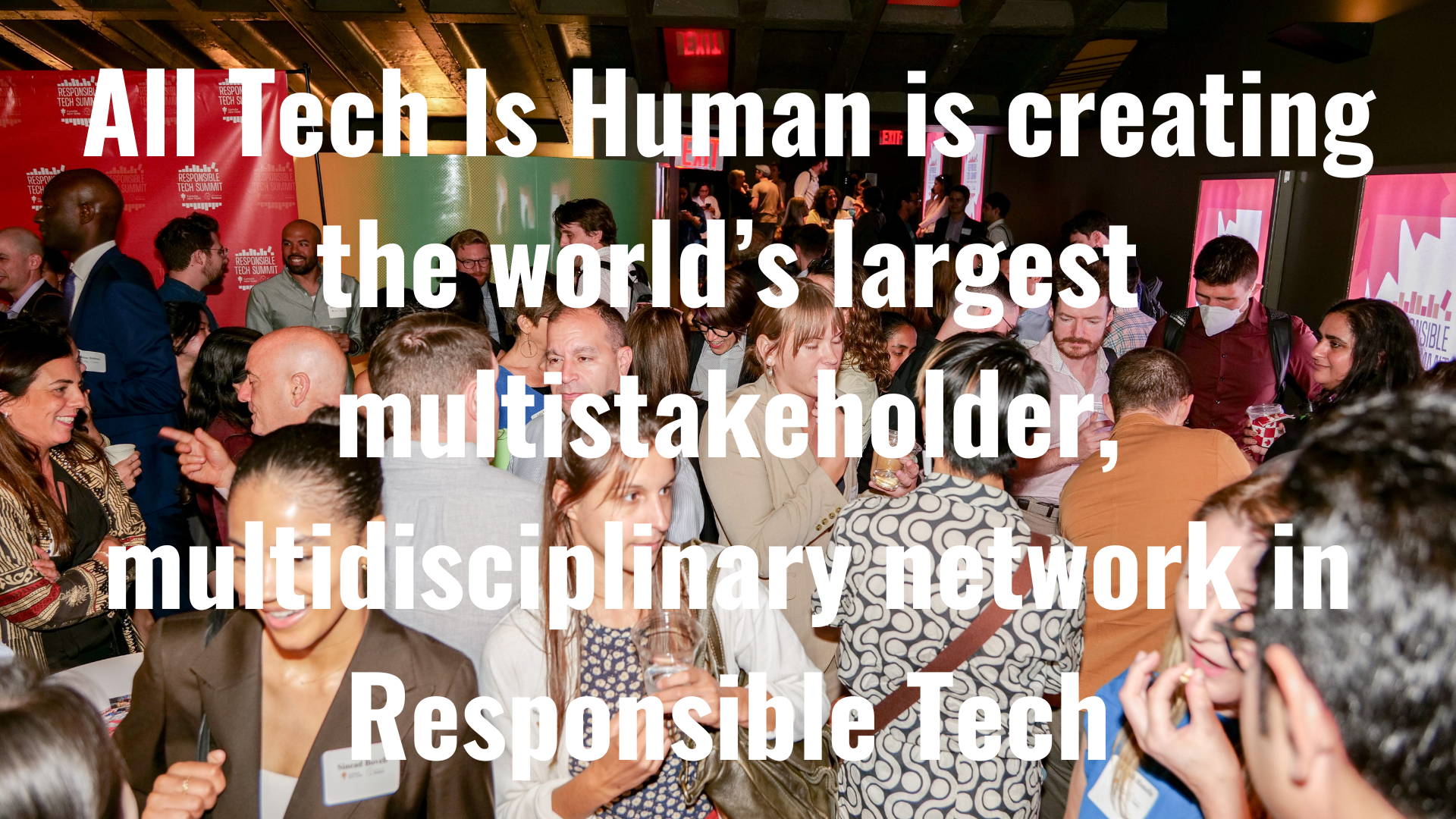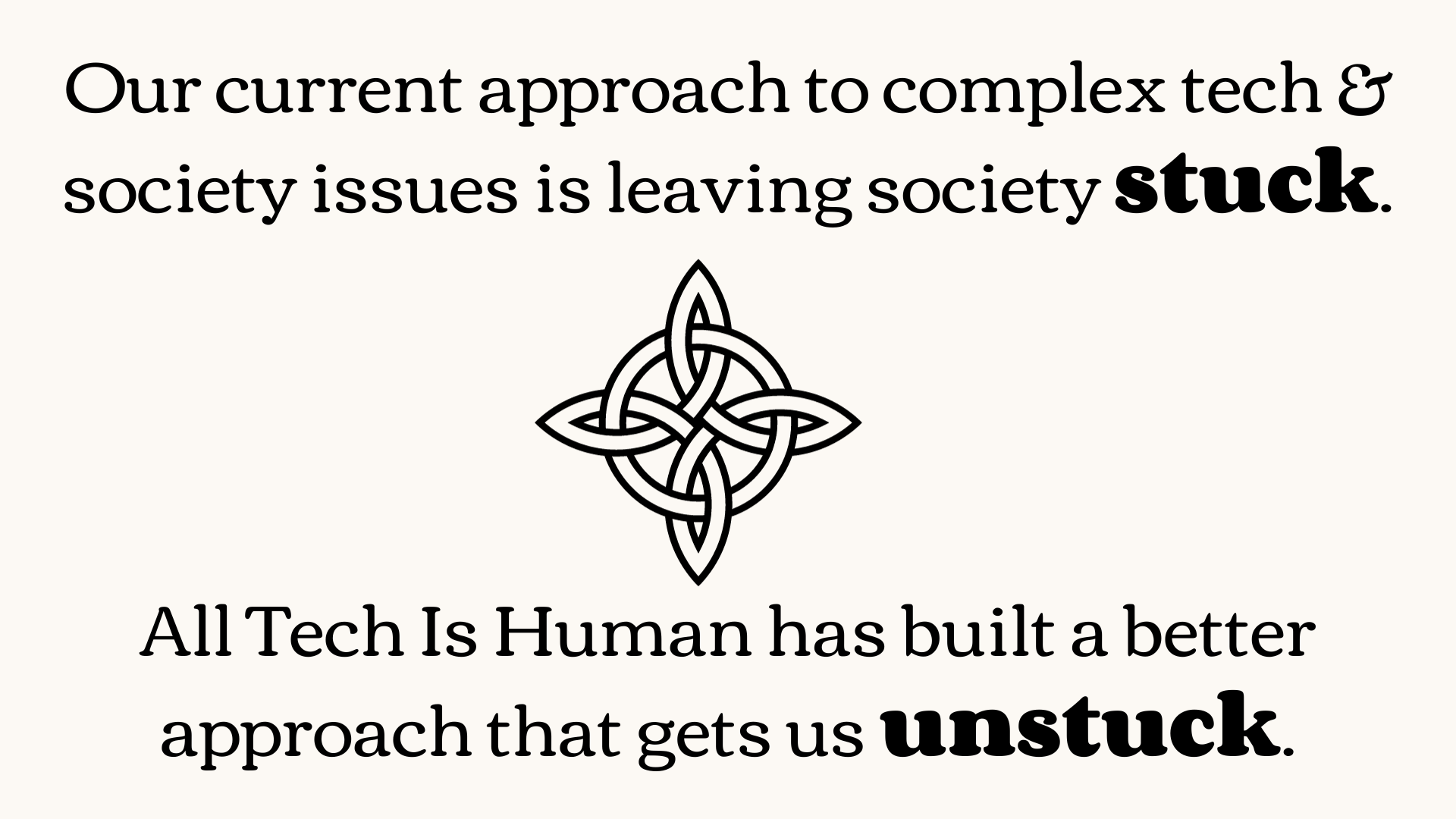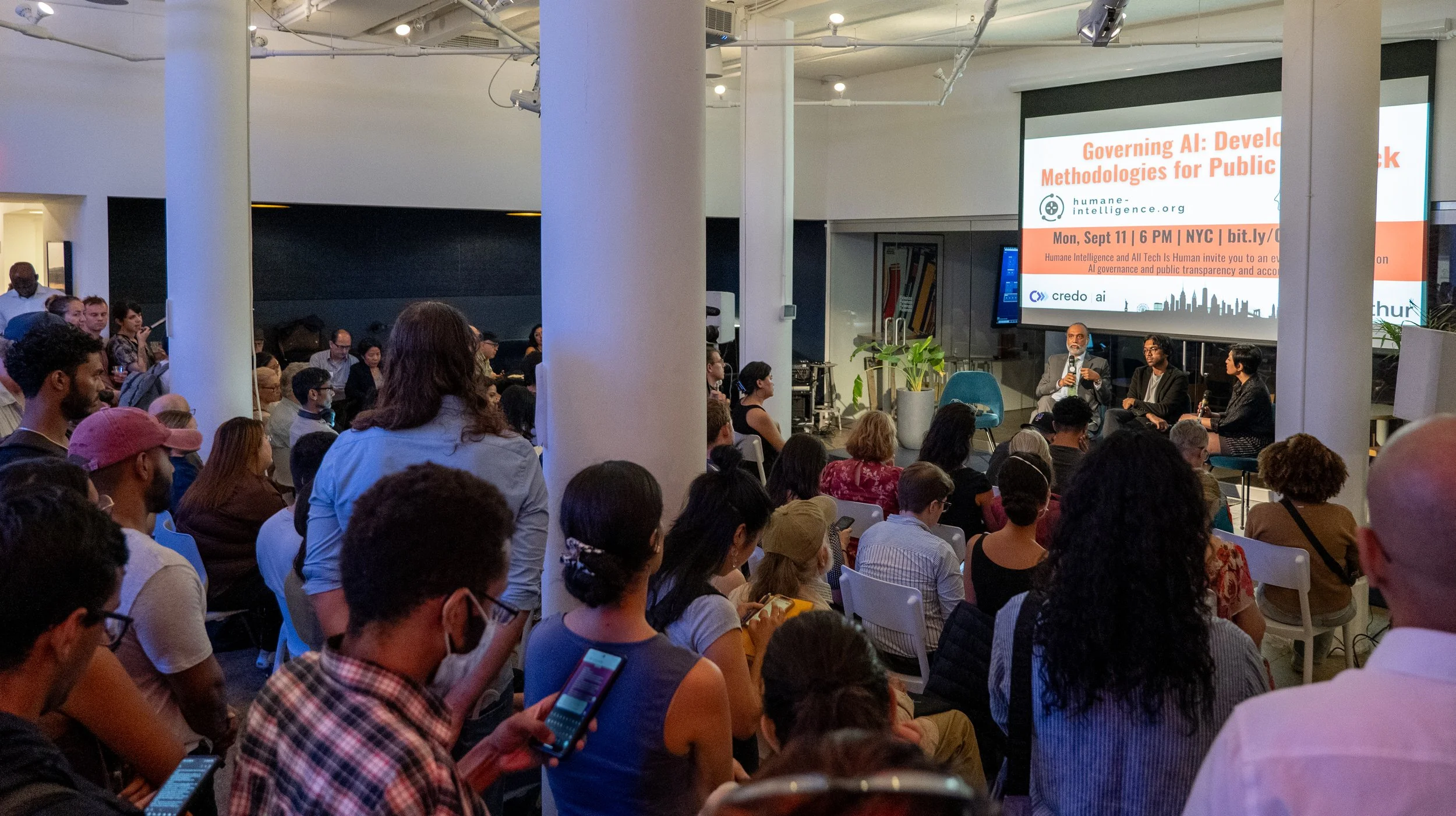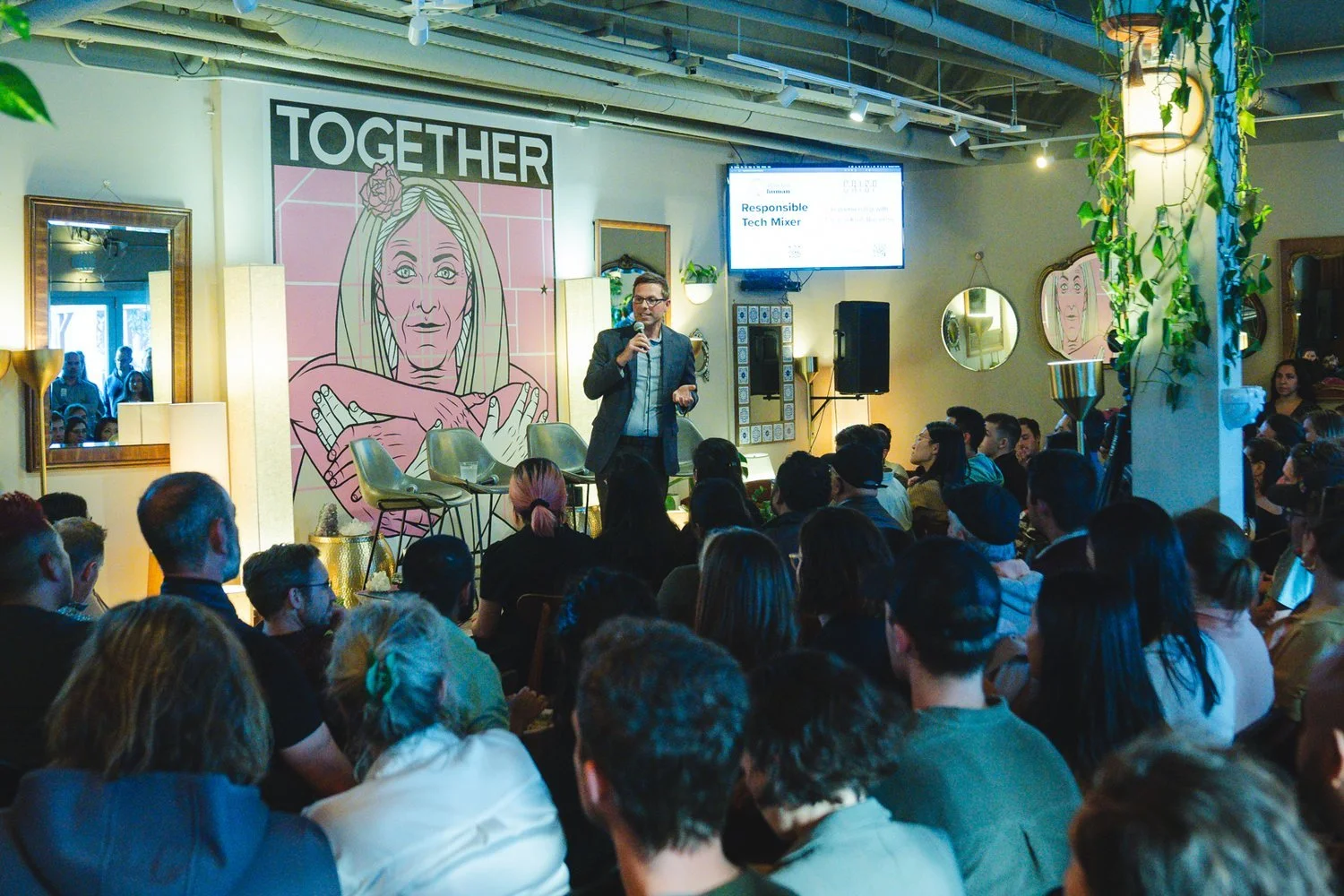All Tech Is Human is intentionally designed to tackle complex tech & society issues while moving at the speed of tech
Whether its ensuring information integrity, creating healthier digital spaces, or dealing with the upheaval of generative AI, there are a wide range of complex tech & society issues that are perplexing governments, tech companies, and the general public. How do we create proactive governments, socially responsible tech companies, and empowered citizens with a voice in creating a tech future aligned with their values?
Our current approach to tackling complex tech & society issues has us stuck.
Tech innovation is moving far faster than our ability to consider its impacts.
Despite hundreds of organizations across the globe working on related issues, we often do not have a conducive environment for knowledge-sharing and collaboration.
We do not have the right mix of people involved in the process.
This is why we are stuck.
All Tech Is Human was founded in 2018. Over the last five years, we have directly interacted with thousands of individuals across the globe to understand how we can better tackle wicked tech & society issues. We have developed into a powerful new way forward, kickstarting the Responsible Tech movement and creating a more robust and collaborative Responsible Tech ecosystem.
All Tech Is Human welcomes Julie Inman-Grant, eSafety Commissioner of Australia, to our NYC office in March 2023. We quickly assembled a mix of attendees across civil society, government, industry, and academia.
All Tech Is Human is building the world’s largest multistakeholder, multidisciplinary network in Responsible Tech. This allows us to tackle thorny tech & society issues while moving at the speed of tech, leverage the collective intelligence of the community, and diversify the pipeline to better match the complexity of the problems we face.
All Tech Is Human, by the numbers:
We will have 23 in-person gatherings just in 2023. Our Responsible Tech Mixer + Interview Series in NYC unites 200 people each month who deeply care about co-creating a better tech future.
Our Slack community includes over 7k members across 87 countries.
Over 1k people have gone through our Responsible Tech Mentorship Program. Our current cohort has over 100 mentors and over 300 mentees.
Our Responsible Tech Job Board is the go-to site for roles related to Responsible AI, Trust & Safety, Tech & Democracy, Public Interest Technology, and Youth/Tech/Wellbeing.
Our Responsible Tech Talent Pool has over 2k individuals.
Through our reports, we have interviewed hundreds of individuals about their role in Responsible Tech, their education journey, advice for others, etc.
Our organization is built to move at the speed of tech, leverage collective intelligence, and diversify the types of people involved in the process. These are the ingredients needed in order to tackle complex tech & society issues.
All Tech Is Human held a gathering for 350 people in London on December 5, 2023 at the historic Conway Hall
Let’s cut right to the chase: our current approach to tackling complex tech & society issues isn’t working well. Issues facing generative AI, social media, and emerging technologies often feel stuck in a Gordian Knot where it is hard to see areas of consensus.
Governments are playing catch-up; reacting to the impacts of technology
Tech companies are feeling increasing pressure to be responsible, but lack clarity as to their role
The general public feels left out; feeling the effects of technology without the proper ability to influence its design, development, and deployment
How do we untangle this Gordian Knot?
There are three main reasons why society is stuck and incapable of successfully tackling complex tech & society issues:
Problem #1: We are moving too slowly.
All Tech Is Human is built as a complex adaptive system that can rapidly convene a diverse range of backgrounds across civil society, government, industry, and academia. Legacy institutes and universities are not designed to move quickly, which is why we need a better approach.
We need to move at the speed of tech. Conversations around Responsible AI, for example, often break down because we get caught up in a debate regarding global competition and the feasibility of slowing down American innovation. The real concern is the wide gulf between how fast innovation moves in comparison to society's ability to understand its current and likely impacts. That means that there is not a binary option between unencumbered innovation on the one hand and pausing or slowing down on the other.
There is a third option that All Tech Is Human embraces: faster consideration. That requires uniting governments, tech companies, researchers, and the general public to massively speed up our ability to understand the impact of technology, to surface our values and coalesce around best practices, and to discover areas of consensus.
All Tech Is Human is designed to be an adaptive system that unites people and ideas across civil society, government, industry, and academia. This provides a middle layer -- a connective tissue that can allow society to tackle these tough issues, like some of those introduced by Generative AI, while moving closer to the speed of tech.
Problem #2: We aren’t leveraging collective intelligence.
The second hurdle is, how do we bring together people, organizations, and ideas? How do we benefit from the whole community and leverage our collective intelligence?
The ecosystem is not cohesive enough.
All Tech Is Human has built a global, multisector multidisciplinary network that operates as a meta-connector to bring together these people, organizations, and ideas to promote knowledge-sharing and collaboration. Our org is designed to be a perpetual feedback loop from involving thousands of people across the globe in our numerous activities across civil society, government, industry, and academia and across all experience levels. This is why we have a Slack community with over 7k members across 87 countries; we have open working groups that mix the emerging with the established, we have over a thousand people who have taken part in our mentorship program; we have regular summits and mixers; we have a university network.
All of our activities – from our events to our programs – are bursting at the seams and over-subscribed, so we are tapping into something powerful. Community-building often doesn't get the respect that it deserves, but it is the hard work that makes a difference.
People need community.
Technology is intertwined with the future of democracy and the human condition – no single person should ever have a concentration of power when it comes to technology that impacts every single one of us. Similarly, people are not looking for one person's ideas to disseminate – people are looking to have their voices heard and to participate in the process. Since tech impacts all of society, all of us should have a say in determining how it is designed, developed, and deployed.
Problem #3: We don’t have a diverse enough mix of backgrounds involved in the process.
The third hurdle is that we don't have a diverse enough mix of people focused on these problems. Complex tech & society issues cannot--and should not--be "solved" by a small sliver of society. Some of the most capable people who are best positioned to help tackle these complex issues have not yet been a part of the process.
There’s a lot of gatekeeping around tech.
If these tech tools are so powerful and so complicated and so impenetrable that you and I cannot understand them, then what they’re implying is that you do not have a place in this conversation and that the future of tech will be made without you; We don’t accept that. Crucially, we need disciplines involved that are focused on empowering problem-finders as opposed to relying solely on problem-solvers. Because you can't solve a problem if you can’t see it. That's why we prioritize diversifying the traditional tech pipeline to include more backgrounds, disciplines, perspectives, and lived experiences.
To that end, we have a Responsible Tech Job Board, a responsible tech talent pool, and a talent matchmaking service; we have upcoming career fairs; we have an extensive mentorship program.
Our recent collaboration with Rumman Chowdhury and her non-profit, Humane Intelligence, in NYC.
So here's the bad news that doesn't get talked enough about: There is no magic tech solution that's going to untangle the deep mess of problems that we’re facing as a society.
Technology is intertwined with society – with human behavior. We need to include technologists and we need them to be more ethical, but we also desperately need to include a wider array of people.
We need to bring on the saints and the poets, the ethicists and the psychologists, the artists, the attorneys, the theologians and philosophers.
You. Me. Everyone.
Quite simply, good things happen when you create welcoming spaces for people to build community, share knowledge, and collaborate. We are creating a space that glues people together.
And that’s the good news: So many people are dedicating their lives and careers to Responsible Tech – people from all backgrounds who care about the future of tech.
We don't lack passion. We don't lack knowledge. What we lack is an interconnected system that benefits everyone. That's what we're trying to do: to grow the ecosystem, to co-create a tech future that’s aligned with the public interest. And that is quite powerful! With the power of community and the power of collective intelligence, we have the power to change systems and to co-create our tech future together.
And that's what we're doing at All Tech Is Human.
We held a Responsible Tech Mixer in SF on Aug 2, 2023
To learn about all of our projects, please visit here.
All Tech Is Human is supported by the Patrick J. McGovern Foundation, Schmidt Futures, Siegel Family Endowment, and more to be announced shortly. Would you like to learn how you can support All Tech Is Human? Please reach out to David Polgar, founder & president.
Upcoming in 2024
Jan 16 | Release of our Responsible Tech Org List 2024
Jan 29 | Data Action Day + Responsible Tech Mixer in NYC w/ guests Tracy Chou & Julia Angwin
Feb 28 | Reducing Online Harms, Creating Healthy Digital Spaces, and Promoting Safety by Design | Washington, DC
March 6 | Ensuring Information Integrity | NYC at the Finnish Consulate + Residence
More to be announced soon…











